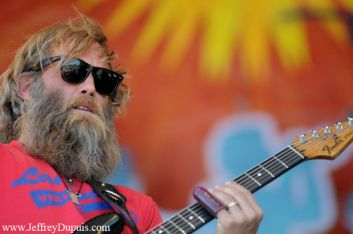
photo by Jeffrey Dupuis
There is a strange symmetry between an Anders Osborne performance and the forces of nature. To watch him play the guitar, to hear him sing, is to witness a whirling dervish of electricity and motion, power and grace, his amps so driven, the tubes develop blisters.
With a voice that recalls equally the blues of the Delta and the singer/songwriter scene of ‘70s California, Anders Osborne seems the iconic American musician. Ironic, then, is the perfect fit between this native of Sweden who’s hitchhiked across the globe, and the stream of inspiration he’s found in post-Katrina New Orleans, where he’s lived for the past 25 years.
We caught up with Anders as he prepared to open his nationwide tour, supported on this sold-out show in Los Angeles by fellow NOLA drummer Stanton Moore and his trio. Osborne’s latest release, American Patchwork (Alligator Records), had just hit stores.
LS: First off, congratulations on your new album, American Patchwork. I haven’t stopped listening to it. There doesn’t seem to be a community in this country that has needed the simultaneous healing and celebration that music provides like New Orleans has needed it. As a favorite son of that city, did you feel any pressure to write songs that contributed to either the healing or celebration following the travesty of Katrina?
AO: Not pressure, but I have been affected by it. It’s a relationship that you have with the city. When you go through something of this depth, it affects everything. It affects how you relate to people for the rest of your life. How you handle yourself, in general. It affects everything. With regards to writing, I get more encouraged than pressured. People will tell me about a song that they really liked, they’ll suggest something, just talking about things; stories about their lives, something that happened, and I get filled with empathy or sympathy, and I get involved. It can trigger wanting to write something. Watching Treme right now on HBO, I see certain scenes, I see my friends on there, hear the music, it makes me want to write a certain song like this or like that again.
LS: Such as?
AO: Like, hearing something that’s damn beautiful. Like, I want to do another dirge. I haven’t written a dirge in a long time. And what would it be, what would it be? Then you start playing and writing. It affects you constantly. Your personal life happens as it happens, but to have a source like the devastation of Katrina- it’s pretty unusual to be able to tap into that, and constantly wanting to express it.
LS: You’re taking an experience and attaching words and sounds to it so that others that have gone through it can relate, or others that haven’t gone through it, can connect to it. Having said that, I felt like Coming Down (Anders first post-Katrina release in 2007) was an extremely intimate record, almost soul-revealing, yet at the same time felt connected to a larger community.
AO: I have no intentions of anything when I write or record it. They are very selfish acts as they go down. You’re just doing something, you’re playing it. What happens when the recording goes down right, and you’re listening back, or even as you’re recording, and it feels extremely elevating and magical- then, you’re happy. I don’t think I ever spent time thinking of a bigger picture. It’s just a very in-the-moment situation with the players you have. If the players are great players, they take the song to a whole new level and help me make the song sound like, “I never thought it could sound this good.” It shows we’re doing this together, and then I’m satisfied. How this resonates with other people? If it resonates with us in the studio, there is bound to be somebody liking it. That’s how I look at it. If we like it, somebody’s got to like it. It can’t be just four or five of us thinking this is cool, and nobody else likes it. That seems kind of odd.


No Comments comments associated with this post